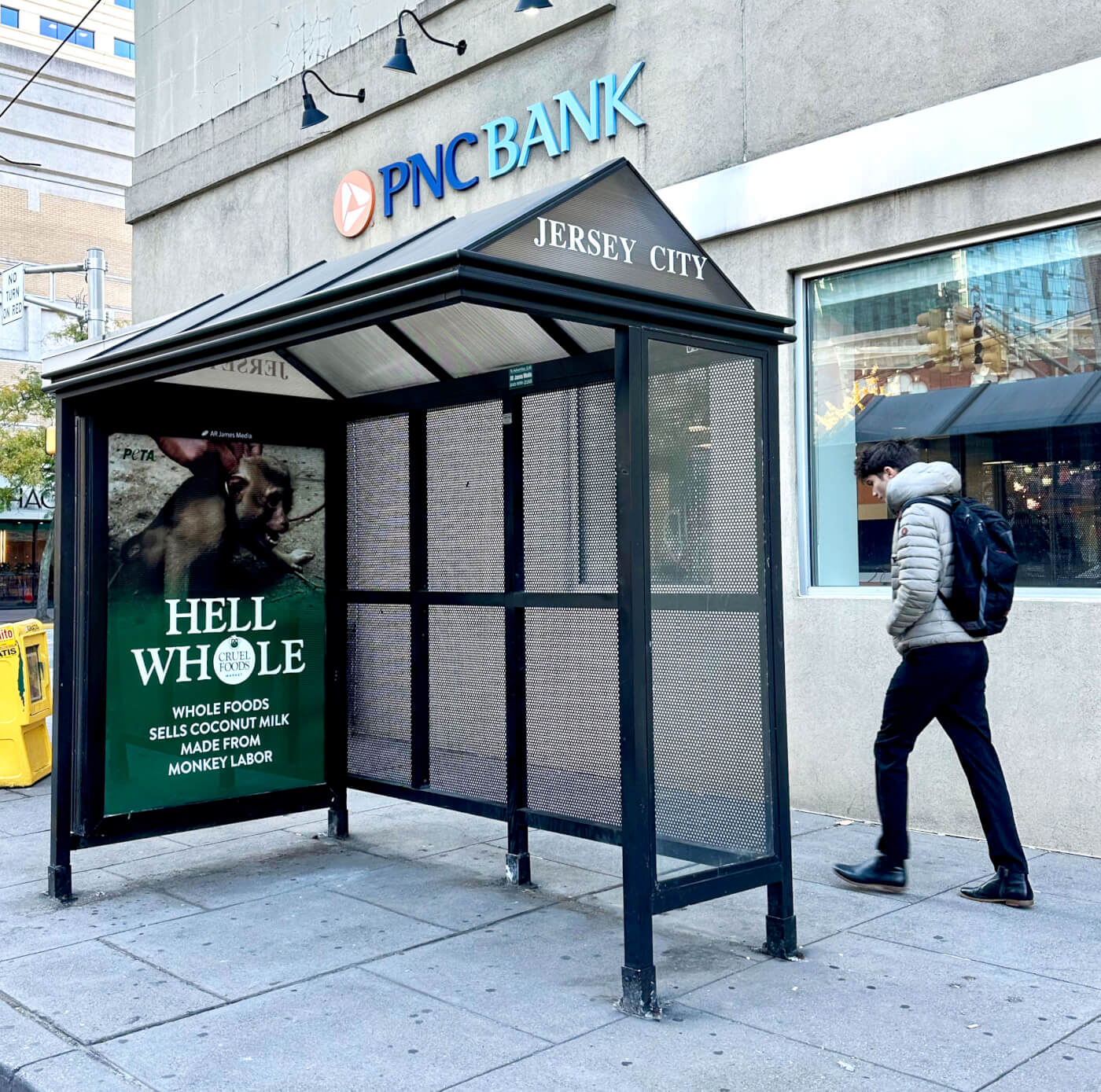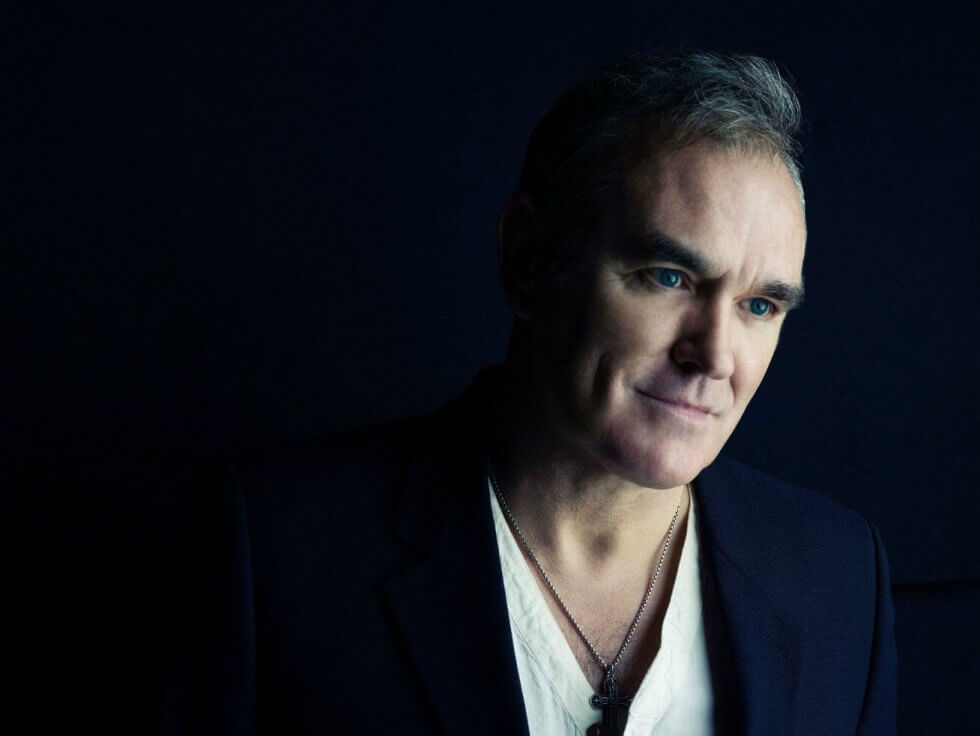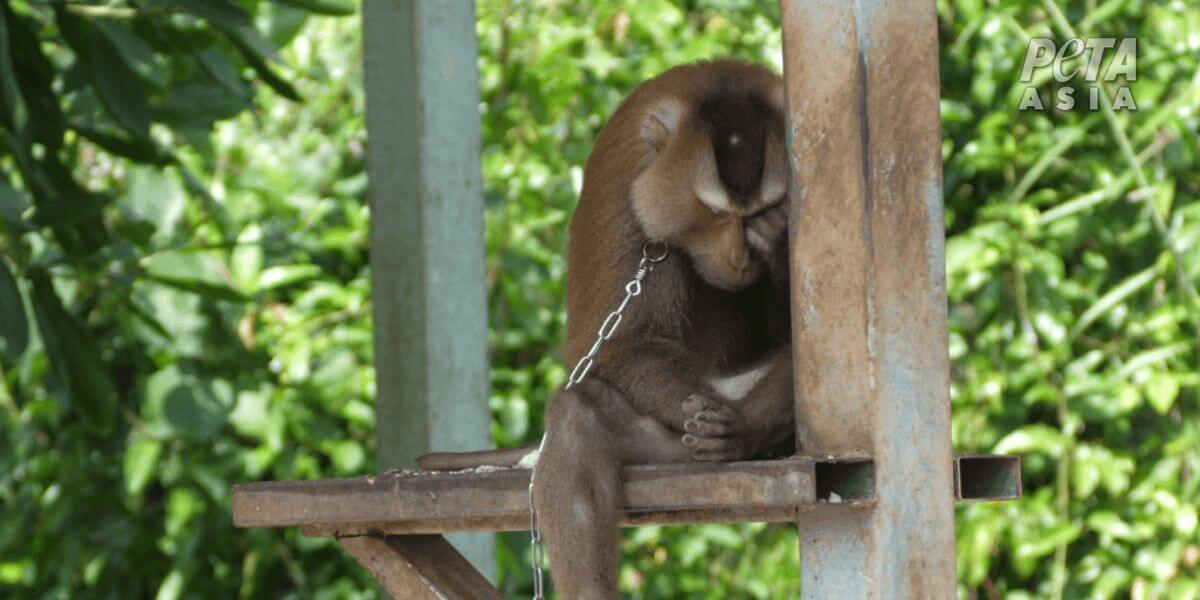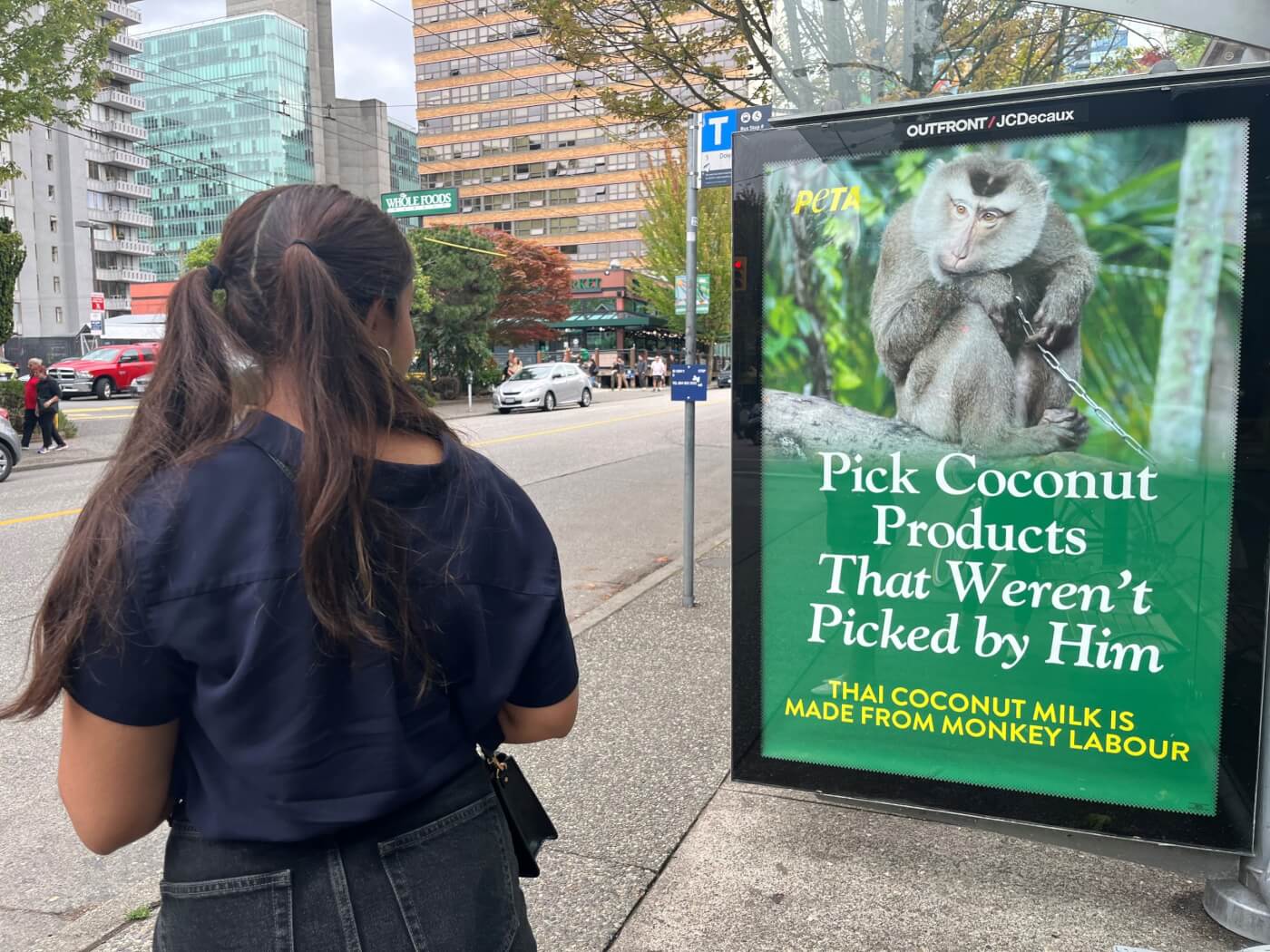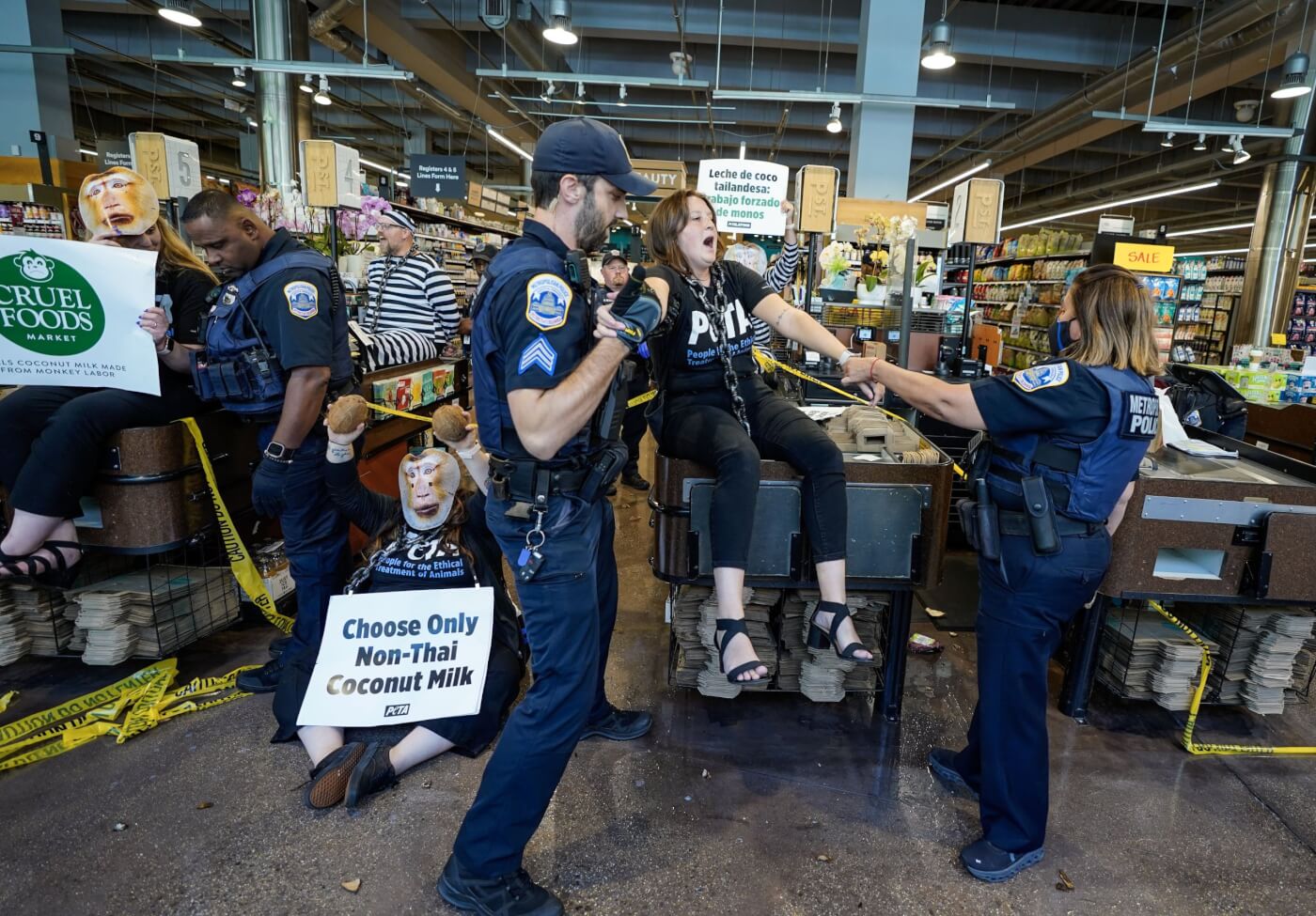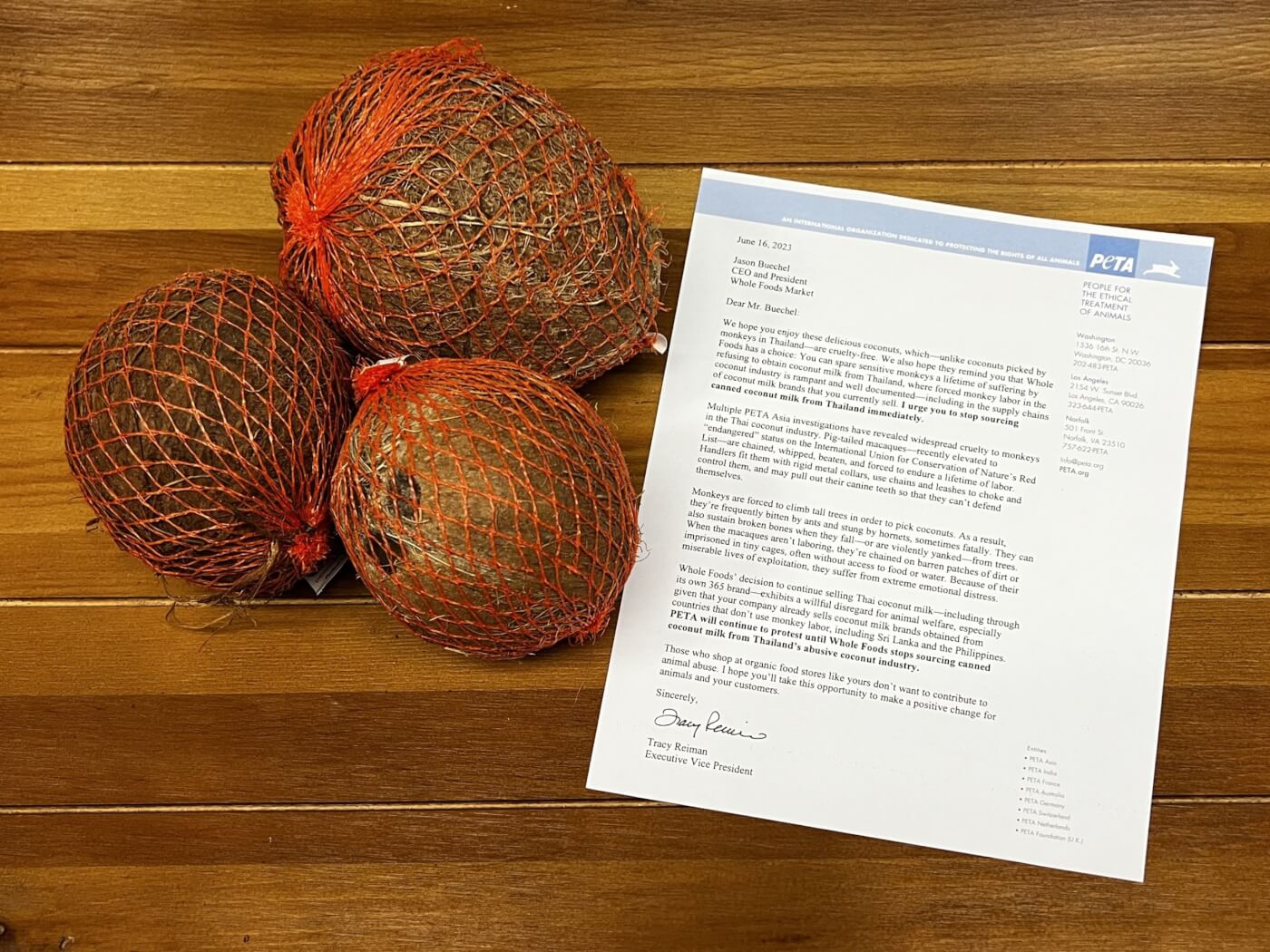PETA Graffities Whole Foods’ HQ Over Monkey Labor
Multiple companies that produce coconut milk sold at Whole Foods were named by industry workers in a PETA Asia investigation as having used coconuts obtained by monkey labor. HelloFresh, Purple Carrot, and Performance Food Group stopped sourcing coconut milk from Thailand following the exposé—but Whole Foods continues to sell Thai coconut milk.
PETA Blasts Whole Foods With Clean Graffiti
April 24, 2024: “Attention, all customers: Whole Foods is responsible for monkey abuse!”That’s the message shoppers and passersby will take away from PETA’s string of graffiti in Austin on Whole Foods’ headquarters and the company’s flagship store.

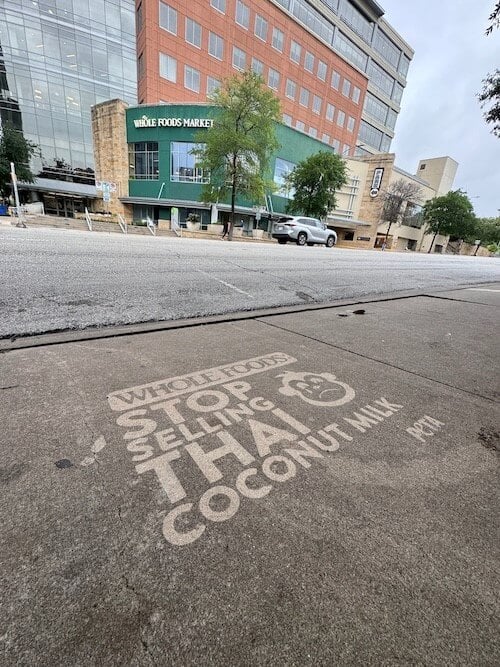
Graffiti artists installed the 10 eye-catching protest pieces in the dead of night, giving Whole Foods’ top brass a wake-up call they won’t forget anytime soon.
The graffiti is clean—meaning there are no harmful paints or other materials to wash off—but that doesn’t mean it won’t last! In fact, Whole Foods will be wearing its shame for up to two months. We think that’s plenty of time to inform Austinites that the treacherous company supports monkey abuse by selling Thai coconut milk.
Whole Foods STILL Refuses to Acknowledge That It Supports Monkey Abuse
In January 2024, we wrote to Whole Foods yet again to let it know that we had found monkey labor in the supply chain of Merit Food Products Co., which is believed to be the coconut milk supplier for the 365 by Whole Foods Market brand. Yet Whole Foods refuses to respond directly to us despite our extensive work exposing the use of forced monkey labor to pick coconuts in Thailand.
Whole Foods knows the story: Endangered monkeys are torn away from their forest homes as infants, whipped, chained, or caged in isolation, and forced to spend long hours climbing trees and picking coconuts. The company supposedly hangs its pride on its “Quality Standards,” so why is it betraying monkeys by sourcing coconut milk from a country that covers up their rampant abuse?
Every day that Whole Foods refuses to ban Thai coconut milk, it props up an industry that exploits and abuses our fellow primates.
PETA’s Campaign of Action Against Whole Foods
PETA Crashes Whole Foods’ CEO’s Birthday
March 25, 2024: If you know PETA, you know we go big. For Whole Foods CEO Jason Buechel’s birthday, we decided to plan something special he won’t forget: an all-out protest outside his lavish high-rise condo this past Sunday, complete with a cake, an 8-foot inflatable monkey, and signs.
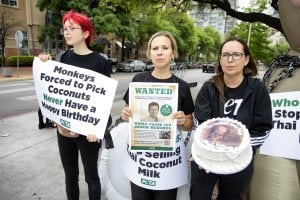
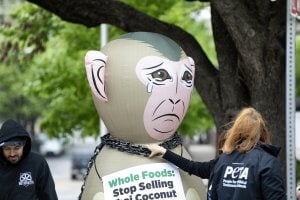
What was the reason for the occasion? While Buechel likely lived it up on his special day, monkeys in Thailand were suffering due to his complete inaction, despite PETA investigations that have repeatedly implicated Thai coconut milk sold at Whole Foods in the use of systemic, forced labor.
The monkey defenders who turned out at Buechel’s condo delivered his cake, which read, “Thai Monkeys Never Have a Happy Birthday, Jason.” Maybe he’ll get the message this time.
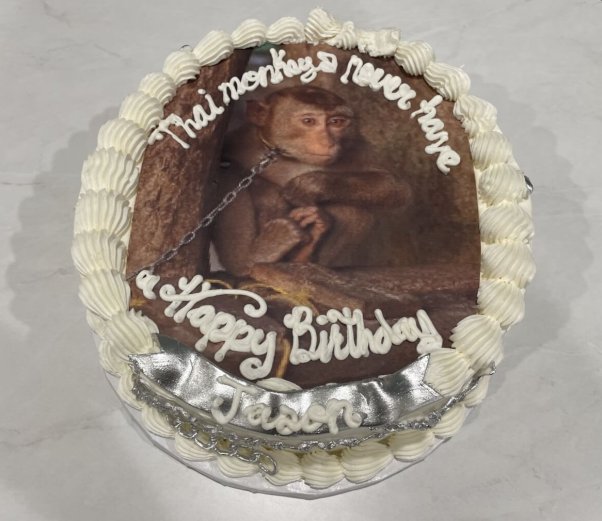
PETA Executive Vice President Tracy Reiman had this to say about the action:
As Buechel celebrates another birthday lounging in luxury, monkeys in Thai jungles are kidnapped, chained up, whipped, and used as coconut-picking machines. Getting monkey abuse out of Whole Foods’ stores would be a piece of cake. All Buechel has to do is hear PETA’s pleas and sell coconut milk from India, the Philippines, and other countries where monkey labor isn’t used.
PETA Brought Its Case Before Amazon’s Shareholders
December 6, 2023: In a shareholder resolution submitted to Amazon today, PETA is challenging company subsidiary Whole Foods’ claims to lead the industry in “responsible sourcing” because it continues to sell Thai coconut milk—including through its own 365 by Whole Foods Market brand—despite receiving ample evidence of the cruelty revealed in PETA Asia’s investigations, which show that in Thailand, monkeys are often captured, forced to pick coconuts, trained through fear of punishment, and chained for life.
Whole Foods claims to obtain its products responsibly, yet it helps prop up the rampant abuse and suffering of monkeys in the Thai coconut industry. PETA is calling on the company to issue a report assessing the feasibility of halting its procurement of any coconut milk from Thailand.
In Thailand’s coconut-picking industry, endangered pig-tailed macaques are often illegally snatched from their forest homes as babies. Handlers put metal collars and leashes on them and may even remove their canine teeth so they can’t defend themselves. PETA Asia’s investigative footage shows trainers striking them, dangling them by their necks, and whipping them.
Because workers in the industry lie and the Thai government ignores the systemic reliance on forced monkey labor, it’s impossible to guarantee that any coconut milk from Thailand is free of it. Coconut milk is widely available from countries that don’t use monkey labor—including the Philippines and Sri Lanka—yet Whole Foods continues to sell coconut milk from Thailand.
PETA’s shareholder resolution was just the latest step in our ongoing campaign to persuade Whole Foods to stop supporting the Thai coconut-picking industry.
On November 15, at the grand opening of the first Whole Foods store in Jersey City, New Jersey, PETA supporters displayed an 8-foot “crying monkey” chained to a massive coconut—an eye-catching reminder that the company continues to sell coconut milk from Thailand.
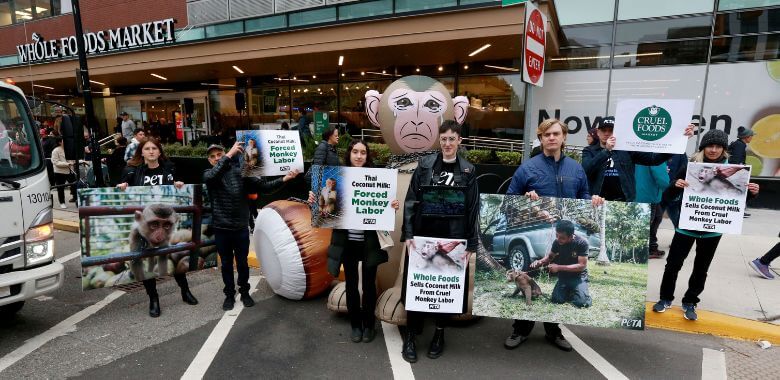
PETA also placed ads on three bus shelters near the new store, which show a distressed monkey in a metal collar with the message “HellWhole: Whole Foods Sells Coconut Milk Made From Monkey Labor.” In nature, macaques are free to forage, explore, and socialize with friends and family. Many monkeys in Thailand’s coconut-picking industry spend their entire lives in chains.
Keep reading to see how PETA’s keeping the pressure on Whole Foods.
Morrissey Calls Out Whole Foods’ Cruelty to Monkeys
October 16, 2023: Longtime PETA supporter and fearless vegan singer Morrissey just told Whole Foods to kick cruel Thai coconut milk to the curb!
The rocker penned a fiery letter to Whole Foods CEO Jason Buechel and Amazon CEO Jeff Bezos (Amazon owns Whole Foods) for choosing to betray Whole Foods’ purported “standard of excellence” by continuing to sell Thai coconut milk despite repeated pleas to stop.
Morrissey’s heartfelt defense of Thai monkeys comes after PETA sent Whole Foods the results of three bombshell investigations into Thailand’s coconut milk industry. Even after learning that the country’s coconut-picking industry is fueled by the labor of endangered pig-tailed macaques—many of whom were illegally snatched from their forest homes as babies—Whole Foods continues to sell Thai coconut milk. Several companies that produce coconut milk brands sold by Whole Foods were named by industry workers as having sourced coconuts obtained via monkey labor.
In the Thai coconut-picking industry, it’s common for handlers to fit monkeys with rigid metal collars. Chains and leashes are used to choke and control them, and some of them endure their canine teeth being pulled out so that they can’t defend themselves.
Because the industry and the Thai government lie about the systemic reliance on forced monkey labor, it’s impossible to guarantee that any coconut milk from Thailand is free of it.
Whole Foods should take this opportunity to listen to Morrissey’s plea—alongside mounting customer complaints—and immediately drop cruelly obtained coconut milk from its inventory. There’s an abundance of high-quality, non-Thai coconut milk brands to choose from, some of which the company already stocks.
Chained Macaque Warns Vancouver Whole Foods Shoppers Where Their Coconut Milk Comes From
An international PETA campaign hitting Whole Foods stores has arrived in Vancouver, Canada, where a vivid image of a chained macaque from a PETA Asia investigation has popped up at a bus shelter across from the company’s Robson Street location. The ad warns shoppers not to buy coconut milk obtained from Thailand, where forced monkey labor is pervasive.
With this new ad campaign, PETA is calling on Whole Foods to sell coconut milk only from countries where monkey labor isn’t used, such as India, Indonesia, and the Philippines. But these anti-speciesist spots at bus stops are just one way that we’re attempting to persuade the company to make the conscientious choice to ban Thai coconut products.
‘Monkey Business’ at Whole Foods: PETA Dumps Coconuts Outside Whole Foods Stores
At head-turning protests across the country, PETA “monkeys” in prisoner costumes have dumped wheelbarrows full of humanely picked coconuts outside Whole Foods stores.
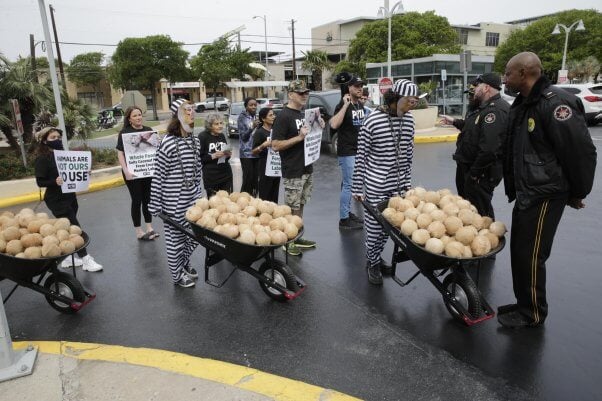
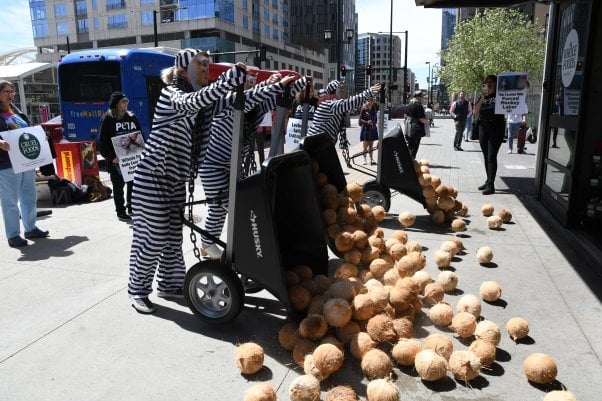
On June 14, 2023, six PETA members were arrested inside a Whole Foods location in Washington, D.C., while holding a sit-in to protest the company’s sale of coconut milk from Thailand.
Special Delivery: PETA Lobs Coconuts at Whole Foods Execs Over Forced Monkey Labor
Whole Foods CEO Jason Buechel and the company’s nine regional presidents received some unusual gifts from PETA. We sent each of them an armload of human-picked coconuts along with a letter urging them to ban Thai coconut milk from Whole Foods’ shelves.

Tell Whole Foods to Stop Hurting Monkeys!
PETA will continue to intensify our efforts to name and shame those at Whole Foods who are responsible for supporting the Thai coconut milk industry. But we still need your help.
Please never buy coconut milk from Thailand, and tell Whole Foods how disappointed you are that it’s supporting monkey abuse.
